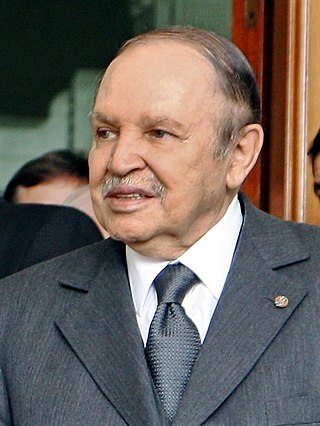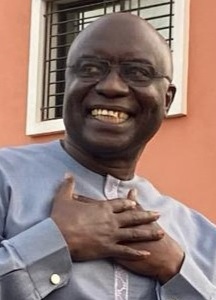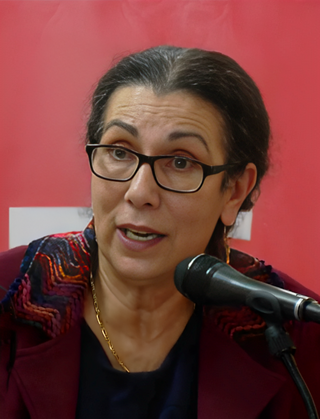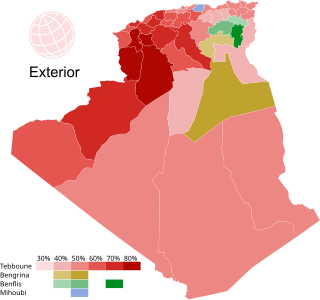| |||||||||||||||||
| Registered | 20,595,683 | ||||||||||||||||
|---|---|---|---|---|---|---|---|---|---|---|---|---|---|---|---|---|---|
| Turnout | 74.56% | ||||||||||||||||
| |||||||||||||||||
 Results by province | |||||||||||||||||
| |||||||||||||||||
 |
|---|
Contents |
Presidential elections were held in Algeria on 9 April 2009. The result was a victory for incumbent President Abdelaziz Bouteflika, who was re-elected with 90% of the vote.
| |||||||||||||||||
| Registered | 20,595,683 | ||||||||||||||||
|---|---|---|---|---|---|---|---|---|---|---|---|---|---|---|---|---|---|
| Turnout | 74.56% | ||||||||||||||||
| |||||||||||||||||
 Results by province | |||||||||||||||||
| |||||||||||||||||
 |
|---|
Contents |
Presidential elections were held in Algeria on 9 April 2009. The result was a victory for incumbent President Abdelaziz Bouteflika, who was re-elected with 90% of the vote.
The Council of Ministers announced on 3 November 2008 that a planned constitutional revision would remove the two-term limit on the presidency that was previously included in Article 74, thereby enabling Bouteflika to run for a third term. [1] The People's National Assembly endorsed the removal of the term limit on 12 November 2008, with only the Rally for Culture and Democracy (RCD) voting against its removal. [2]
Thirteen candidates submitted papers to contest the election, but only six were approved to run: [3]
Although some urged former President Liamine Zéroual to run, he said in a published statement on 14 January 2009 that he would not, while also suggesting that it was not in the best interests of democracy for Bouteflika to run for a third term. [5]
RCD President Saïd Sadi announced on 15 January 2009 that the RCD would not participate in the elections, which he described as a "pathetic and dangerous circus", saying that to participate "would be tantamount to complicity in an operation of national humiliation". [2]
Bouteflika announced his independent candidacy for a third term at a rally in Algiers on 12 February, [6] and officially submitted his candidacy on 23 February, shortly before the deadline. [7]
The official turnout of 75% was disputed by the opposition, with some claiming it was as low as 16%. [8]
| Candidate | Party | Votes | % | |
|---|---|---|---|---|
| Abdelaziz Bouteflika | National Liberation Front | 13,019,787 | 90.23 | |
| Louisa Hanoune | Workers' Party | 649,632 | 4.50 | |
| Moussa Touati | Algerian National Front | 294,411 | 2.04 | |
| Djahid Younsi | Movement for National Reform | 208,549 | 1.45 | |
| Belaïd Mohand-Oussaïd | Independent | 133,315 | 0.92 | |
| Ali Fawzi Rebaine | Ahd 54 | 124,559 | 0.86 | |
| Total | 14,430,253 | 100.00 | ||
| Valid votes | 14,430,253 | 93.97 | ||
| Invalid/blank votes | 925,771 | 6.03 | ||
| Total votes | 15,356,024 | 100.00 | ||
| Registered voters/turnout | 20,595,683 | 74.56 | ||
| Source: Electoral Studies | ||||

Abdelaziz Bouteflika was an Algerian politician and diplomat who served as the seventh president of Algeria from 1999 to his resignation in 2019.

Idrissa Seck is a Senegalese politician who was Prime Minister of Senegal from November 2002 to July 2004. He was a leading member of the Senegalese Democratic Party (PDS) and was considered a protégé of President Abdoulaye Wade, but he subsequently went into opposition and was a candidate in the February 2007 presidential election, coming second place with about 15% of the vote.

The Movement of Society for Peace, sometimes known by its shortened form Hamas, is a Sunni Islamist party in Algeria, led by Mahfoud Nahnah until his death in 2003. Its current leader is Abderrazak Makri. It is an offshoot of the Muslim Brotherhood.

Ali Benflis is an Algerian politician who was Head of Government of Algeria from 2000 to 2004. In 2003, he became the general secretary of the National Liberation Front party. Benflis was a candidate in the 2004 presidential election, but the poll resulted in the re-election of Abdelaziz Bouteflika. Benflis ran yet again as an independent candidate in the 2014 Algerian presidential elections held on 17 April 2014. The result was that Abdelaziz Bouteflika was reelected as president with 81.53% of the votes, with Benflis ending as runner-up with 12.18%.

Liamine Zéroual is an Algerian politician who was the sixth President of Algeria from 30 January 1994 to 27 April 1999.

Louisa Hanoune is the head of Algeria's Workers' Party. In 2004, she became the first woman to run for President of Algeria. Hanoune was imprisoned by the government several times prior to the legalization of political parties in 1988. She was jailed soon after she joined the Trotskyist Social Workers Organisation, an illegal party, in 1981 and again after the 1988 October Riots, which brought about the end of the National Liberation Front's (FLN) single-party rule. During Algeria's civil war of the 1990s, Hanoune was one of the few opposition voices in parliament, and, despite her party's laicist values, a strong opponent of the government's "eradication" policy toward Islamists. In January 1995, she signed the Sant'Egidio Platform together with representatives of other opposition parties, notably the Islamic Salvation Front, the radical Islamist party whose dissolution by military decree brought about the start of the civil war.

Presidential elections were held in Algeria on 8 April 2004. Incumbent President Abdelaziz Bouteflika was re-elected with 85% of the vote.

Saïd Sadi is an Algerian politician who was President of the Rally for Culture and Democracy (RCD) until 2012. He is founder of the first Algerian human rights league.

Presidential elections were held in Mali on 29 April 2007. Incumbent president Amadou Toumani Touré ran for re-election against seven other candidates and won in the first round with about 71% of the vote.

General elections were held in Malawi on 19 May 2009. Incumbent President Bingu wa Mutharika ran for re-election; his main opponent was John Tembo, the president of the Malawi Congress Party (MCP). Five other candidates also ran. The election was won by Mutharika, who was re-elected to the Presidency with around two-thirds of the vote. Mutharika's DPP also won a strong parliamentary majority.

Presidential elections were held in Algeria on 15 April 1999. Abdelaziz Bouteflika was elected with 74% of the vote after the other six candidates withdrew on the eve of the elections.

Presidential elections were held in the Republic of the Congo on 12 July 2009. Long-time President Denis Sassou Nguesso won another seven-year term with a large majority of the vote, but the elections were marred by accusations of irregularities and fraud from the opposition; six opposition candidates chose to boycott the elections.

General elections to elect the president, Assembly of the Republic, and Provincial Assemblies was held in Mozambique on 28 October 2009. Incumbent President Armando Guebuza ran for re-election as the FRELIMO candidate; he was challenged by opposition leader Afonso Dhlakama, who had stood as the RENAMO candidate in every presidential election since 1994. Also standing were Daviz Simango, the Mayor of Beira, who was a RENAMO member before founding his own party, the Democratic Movement of Mozambique (MDM), earlier in 2009.

General elections were held in the Central African Republic on 23 January 2011 to elect the President and National Assembly, having been postponed numerous times. Incumbent President François Bozizé was re-elected for a second term in the first round of voting, receiving 66% of the vote. The organization of the elections was plagued by difficulties, and the opposition repeatedly demanded its postponement. Ultimately it was delayed until January 2011, requiring an extension of the terms of both the President and the National Assembly.

Presidential elections were held in Guinea-Bissau on 28 June 2009 following the assassination of President João Bernardo Vieira on 2 March 2009. As no candidate won a majority in the first round, a second round was held on 26 July 2009 between the two leading candidates, Malam Bacai Sanhá of the governing African Party for the Independence of Guinea and Cape Verde (PAIGC) and opposition leader Kumba Ialá. Sanhá won with a substantial majority in the second round, according to official results.

Parliamentary elections were held in Algeria on 10 May 2012. The incumbent coalition, consisting of the National Liberation Front (FLN) of President Abdelaziz Bouteflika and the National Rally for Democracy (RND) of Prime Minister Ahmed Ouyahia, held on to power after winning a majority of seats. The Islamist parties of the Green Algeria Alliance lost seats.

Presidential elections were held in Algeria on 17 April 2014. Incumbent President Abdelaziz Bouteflika was re-elected with 82% of the vote. Issues in the campaign included a desire for domestic stability after the bloody civil war of the 1990s, the state of the economy, the frail health of the 15 year incumbent and 77-year-old president whose speech was "slurred and inaudible" in his only public outing during the campaign, and the less-than-wholehearted support given the president by the normally united and discrete ruling class.

Presidential elections were held in Algeria on 12 December 2019. The election had originally been scheduled for 18 April, but was postponed due to sustained weekly protests against plans by the incumbent president Abdelaziz Bouteflika to run for a fifth term. Bouteflika resigned on 2 April and Abdelkader Bensalah was elected acting president by parliament a week later. On 10 April the election was rescheduled for 4 July. On 2 June the Constitutional Council postponed the elections again, citing a lack of candidates. A new electoral authority, Autorité nationale indépendante des élections (ANIE), was created in mid-September as an alternative to the existing Haute instance indépendante de surveillance des élections (HIISE) defined by the 2016 constitution. The election was rescheduled for 12 December 2019 and ANIE, of disputed constitutional validity, announced five valid candidates on 2 November. In their 200000 strong protest on 1 November, Algerian protestors rejected the 12 December election and called for a radical change in the system to take place first. The Forces of the Democratic Alternative (FDA) alliance and the Justice and Development Front also called for boycotting the 12 December election, and the FDA called for creating a constituent assembly.

The 2019–2021 Algerian protests, also called Revolution of Smiles or Hirak, began on 16 February 2019, six days after Abdelaziz Bouteflika announced his candidacy for a fifth presidential term in a signed statement. These protests, without precedent since the Algerian Civil War, were peaceful and led the military to insist on Bouteflika's immediate resignation, which took place on 2 April 2019. By early May, a significant number of power-brokers close to the deposed administration, including the former president's younger brother Saïd, had been arrested.

A constitutional referendum was held in Algeria on 1 November 2020. The subject of the referendum was a revision of the Algerian constitution, and it follows a series of protests known as Hirak.